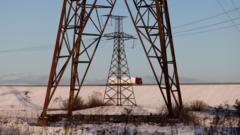**The Baltic countries are set to disconnect from Russian power sources, marking a historic shift in their energy independence amidst rising tensions with Moscow.**
**Baltic States Prepare for Major Electrical Independence from Russia**

**Baltic States Prepare for Major Electrical Independence from Russia**
**Estonia, Latvia, and Lithuania take crucial step toward aligning with the European Union power grid.**
In a significant move towards energy independence, the Baltic states of Estonia, Latvia, and Lithuania are set to disconnect from the Russian power grid and integrate into the European Union's electricity network. This historical transition will commence over a two-day period starting Saturday, accompanied by preparations for residents to stockpile supplies and ensure their readiness for potential disruptions.
The transition away from the Brell power grid, which has linked these nations with Russia and Belarus since the end of World War II, will be heralded with a ceremonial countdown in Lithuania’s capital. EU Commission President Ursula von der Leyen is expected to attend the landmark event, marking the culmination of more than a decade's effort to sever energy ties with the Kremlin. As these countries disconnect, they will temporarily operate on their own electricity supply for about 24 hours before connecting to the EU grid through Poland.
Lithuania’s Energy Minister, Zygimantas Vaiciunas, emphasized that this decisive action removes Russia's leverage to leverage energy as a means of political coercion. Experts note that this move shatters the long-held perception of the Baltic states as "energy islands" dependent on Russian power, a dependency ingrained since their Soviet Union past.
In parallel with this transition, concerns over Russian aggression have heightened, especially following the invasion of Ukraine in February 2022. There has been a spate of suspected sabotage incidents involving undersea cables, amplifying fears of potential Russian retaliation against these nations’ shift towards European energy integration.
Tensions have risen significantly since the reports of damage to at least 11 undersea cables in the Baltic region. President of Latvia, Edgars Rinkēvičs, acknowledged the possibility of provocations from Russia, while Prime Minister Evika Silina assured that security measures and contingency plans are in place to address any arising threats.
In light of these tensions, NATO has bolstered its presence in the region through a new mission aimed at safeguarding critical undersea infrastructure. Additionally, cyber-security experts in Estonia are on high alert for possible cyber-attacks and disinformation campaigns, as they have already observed increased hacking efforts after the onset of the Ukraine conflict.
Thus, as the Baltic states stand on the brink of an energy revolution, they remain vigilant against the risks posed by their historical energy dependency, preparing for both physical and cyber threats as they embark on this new chapter of energy autonomy.




















